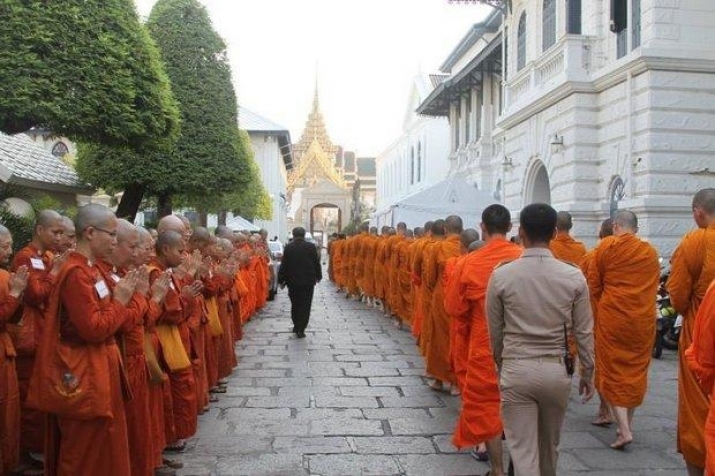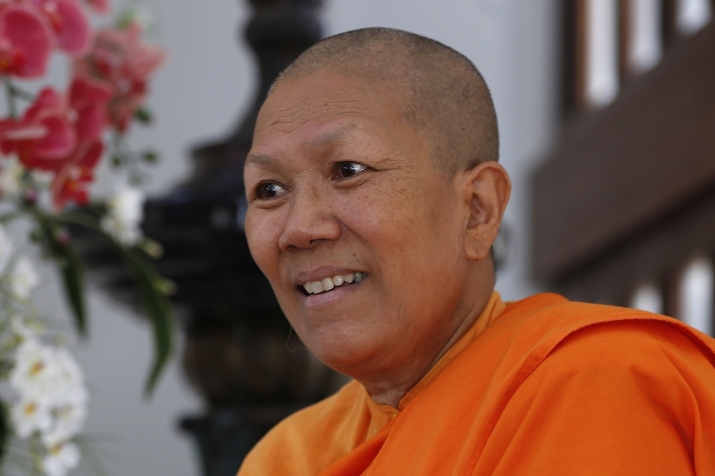NEWS
Female Monastics in Thailand Barred From Paying Respects to Late King
 After being denied admission to pay their respects to Thailand's late king Bhumibol Adulyadej, female monks, left, paid respect to monks being escorted into the Grand Palace to attend the royal funeral ceremony. From bangkokpost.com
After being denied admission to pay their respects to Thailand's late king Bhumibol Adulyadej, female monks, left, paid respect to monks being escorted into the Grand Palace to attend the royal funeral ceremony. From bangkokpost.comAs millions of people across Thailand continue to mourn the passing of the widely beloved King Bhumibol Adulyadej (9 June 1946–13 October 2016), and Thais flock to pay their respects at Bangkok’s Grand Palace, where the late monarch lies in state, one segment of society in this Buddhist kingdom has been blocked from visiting the royal funeral ceremony—bhikkhunis, or fully ordained female monastics.
A recent commentary in the Bangkok Post newspaper notes that in December, a group of bhikkhunis from the central province of Nakhon Pathom were turned away from the Grand Palace and reprimanded for wearing the saffron robes of Theravada monks. In a similar incident in November, a party of bhikkhunis from the southern province of Songkhla were also denied entry. Both groups were confronted by officials from the National Office of Buddhism and Mahachulalongkornrajavidyalaya, a Buddhist university, who are in charge of screening monastic visitors.
While predominantly a Theravada Buddhist country—93.2 per cent of Thailand’s population of 69 million identify as Buddhists, according to 2010 data from the Washington, DC-based Pew Research Center—Thailand has never officially recognized the full monastic ordination of women, which is still banned there. Despite this official opposition, communities of female renunciants do exist, some of whom have been ordained overseas, but they do not enjoy the same level of societal acceptance as their male counterparts. By comparison, the Mahayana branch of Buddhism more common in East Asia has historically ordained women.
“We were shocked and humiliated,” recalled Venerable Dhammananda Bhikkhuni, who ordained in Sri Lanka in 2001, becoming Thailand’s first fully ordained Theravada nun. “We’d already received confirmation from the palace office that our turn to pay respects to the late monarch was set for 3.30pm. So we didn’t expect this to happen at all.” (Bangkok Post)
 Venerable Dhammananda Bhikkhuni ordained in Sri Lanka in 2001, becoming Thailand’s first fully ordained Theravada nun. From japantimes.co.jp
Venerable Dhammananda Bhikkhuni ordained in Sri Lanka in 2001, becoming Thailand’s first fully ordained Theravada nun. From japantimes.co.jp“We explained . . . that as Theravada bhikkhuni ordained in Sri Lanka, we are not part of the Thai clergy. So the rules prohibiting female ordination by the Thai clergy do not apply to us. Besides, we have already received the palace’s permission to come,” said Venerable Dhammananda, who had led 70 bhikkhunis and novices to the royal funeral.
The late king, Bhumibol Adulyadej, also known as Rama IX as the ninth monarch of the Chakri dynasty, was the world's longest-serving head of state and the longest-reigning monarch in Thai history, having reigned for more than 70 years. Widely loved and respected in Thailand, he was seen as a unifying figure of stability in the country that has struggled through decades of political instability punctuated by numerous military coups. His only living son, Maha Vajiralongkorn, has since assumed the throne.
According to the official in charge, Assistant Professor Teerapak Chaichana of the monastic university, “All this is a matter of rules and regulations, not discrimination.” In addition to female monks, Prof. Teerapak said, monastics who had been ostracized by the Ecclesiastic Council were also unable to visit the funeral rites for the late monarch because they lacked the necessary clerical certification. He added that white-robed Buddhist nuns, who are not ordained monastics, were only allowed to enter through the channel designated for lay people. However, foreign monks and bhikkhuni with passports were permitted to enter, he observed.
Despite this very open opposition from the male-dominated officialdom of Thailand’s monastic sangha, Ven. Dhammananda remains undaunted. Bhikkhunis in Thailand are winning the hearts and minds of lay Buddhists, and the nuns of Songdhammakalyani Monastery, which Ven. Dhammananda heads, are fully socially engaged. Their activities include visiting prisons to provide Dhamma teachings, helping the poor and deprived, and maintaining ties with nearby communities in Nakhon Pathom. According to media reports, hundreds of lay Buddhists regularly visit the monastery to hear Dhamma talks delivered by Venerable Nandanyani Bhikkhuni, a former mathematician. The monastery also holds weekend Dhamma camps, which include meditation instruction for parents and their children.
“Actually, we have received support from many broad-minded monks. Change is taking place in favor of female ordination, not only in Thailand but elsewhere in the world,” said Ven. Dhammananda. “Whatever challenges lie ahead, we will still practice as Bhikkhuni. Whatever resistance from the establishment, more women will choose to pursue a spiritual path as female monastics.” (Bangkok Post)
See more
Female monks barred from paying respects (Bangkok Post)
Related news from Buddhistdoor Global
Thai Parliament Empowers King to Appoint Supreme Sangha Head
Ven. Prayudh Payutto Bestowed Somdej Rank in Thai Supreme Sangha Council
Thailand Unveils Design of Funeral Pyre for Thai King Symbolizing Mount Meru
Thai King Memorialized in Buddhist Temples Around the World
Well-wishers Flock to Temples to Pray for Recovery of Ailing Thai King
Outstanding Buddhist Women Award Ceremony Held in Taiwan
The Thai Bhikkhuni Order: From One to One Hundred and More to Come
Related features from Buddhistdoor Global
Anukampa Bhikkhuni Project: Nuns’ Monastery Set to Become Reality
Reviving the Bhikkhuni Sangha in Indonesia: an Interview with Ayya Santini
The 2,600th Anniversary of the Global Bhikkhuni Sangha and Fourfold Sangha of the Buddha
Anukampa Bhikkhuni Project: The First Buddhist Nunnery in the UK
Offering Welcome: Ayya Tathaloka














